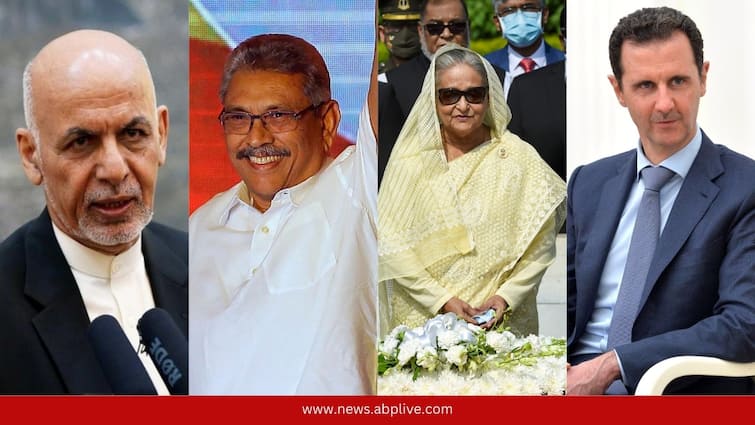Throughout history, there have been instances of leaders fleeing their countries amid political turmoil, uprisings, or external pressures. Many rulers who once held unchallenged authority have been forced to abandon their posts and flee their homelands. The trend has not abated in the modern era too. From presidents escaping under the shadow of advancing rebels to leaders ousted by public fury, the reasons may differ, but the outcomes are strikingly similar: exile, instability, and national turmoil.
In recent years, there have been at least four leaders who were forced to abandon their positions and seek refuge abroad. From Ashraf Ghani in Afghanistan to Bashar al-Assad in Syria, here is a look at these notable cases.
Ashraf Ghani (Afghanistan, 2021)
In August 2021, Ashraf Ghani fled Afghanistan as the Taliban closed in on Kabul. The US-backed president departed abruptly to what he said “prevent the destruction of Kabul”, leaving the nation in chaos. His departure marked the end of a 20-year conflict and symbolised the failure of the international intervention in Afghanistan. Ghani later resurfaced in the United Arab Emirates, stating that he left to avoid a bloody confrontation.
Gotabaya Rajapaksa (Sri Lanka, 2022)
Sri Lanka’s economic crisis reached its peak in 2022, with citizens enduring fuel shortages, inflation, and protests. President Gotabaya Rajapaksa fled the country in July that year as protesters stormed his official residence. He first traveled to the Maldives and then to Singapore, where he formally resigned. Rajapaksa’s departure highlighted the severe consequences of economic mismanagement, and ended the rule of a family dynasty that had dominated Sri Lanka’s politics for two decades. Rajapaksa returned to the country in September 2022.
Sheikh Hasina (Bangladesh, 2024)
In August 2024, Bangladeshi Prime Minister Sheikh Hasina fled to India following massive protests and violent clashes. The unrest, initially sparked by student-led demonstrations, escalated into widespread demands for her resignation, culminating in protesters storming her official residence. Her departure marked a significant political crisis in Bangladesh, leaving the nation in turmoil and uncertainty about its future that still continues under the interim government being led by Nobel laureate Muhammad Yusuf.
Bashar al-Assad (Syria, 2024)
After 24 years in power and over 13 years of civil war, Bashar al-Assad fled Syria on December 8, 2024. Rebel forces staged a rapid advance, capturing Damascus and key cities early Sunday morning. Assad’s departure ended more than five decades of his family’s rule. Reports suggest he left the country on a plane, but his exact destination remains unclear. His exit leaves Syria devastated, with millions displaced and a fractured society struggling to rebuild, even as a section celebrates the end of what they have termed an oppressive regime.
Throughout history, there have been instances of leaders fleeing their countries amid political turmoil, uprisings, or external pressures. Many rulers who once held unchallenged authority have been forced to abandon their posts and flee their homelands. The trend has not abated in the modern era too. From presidents escaping under the shadow of advancing rebels to leaders ousted by public fury, the reasons may differ, but the outcomes are strikingly similar: exile, instability, and national turmoil.
In recent years, there have been at least four leaders who were forced to abandon their positions and seek refuge abroad. From Ashraf Ghani in Afghanistan to Bashar al-Assad in Syria, here is a look at these notable cases.
Ashraf Ghani (Afghanistan, 2021)
In August 2021, Ashraf Ghani fled Afghanistan as the Taliban closed in on Kabul. The US-backed president departed abruptly to what he said “prevent the destruction of Kabul”, leaving the nation in chaos. His departure marked the end of a 20-year conflict and symbolised the failure of the international intervention in Afghanistan. Ghani later resurfaced in the United Arab Emirates, stating that he left to avoid a bloody confrontation.
Gotabaya Rajapaksa (Sri Lanka, 2022)
Sri Lanka’s economic crisis reached its peak in 2022, with citizens enduring fuel shortages, inflation, and protests. President Gotabaya Rajapaksa fled the country in July that year as protesters stormed his official residence. He first traveled to the Maldives and then to Singapore, where he formally resigned. Rajapaksa’s departure highlighted the severe consequences of economic mismanagement, and ended the rule of a family dynasty that had dominated Sri Lanka’s politics for two decades. Rajapaksa returned to the country in September 2022.
Sheikh Hasina (Bangladesh, 2024)
In August 2024, Bangladeshi Prime Minister Sheikh Hasina fled to India following massive protests and violent clashes. The unrest, initially sparked by student-led demonstrations, escalated into widespread demands for her resignation, culminating in protesters storming her official residence. Her departure marked a significant political crisis in Bangladesh, leaving the nation in turmoil and uncertainty about its future that still continues under the interim government being led by Nobel laureate Muhammad Yusuf.
Bashar al-Assad (Syria, 2024)
After 24 years in power and over 13 years of civil war, Bashar al-Assad fled Syria on December 8, 2024. Rebel forces staged a rapid advance, capturing Damascus and key cities early Sunday morning. Assad’s departure ended more than five decades of his family’s rule. Reports suggest he left the country on a plane, but his exact destination remains unclear. His exit leaves Syria devastated, with millions displaced and a fractured society struggling to rebuild, even as a section celebrates the end of what they have termed an oppressive regime.
Throughout history, there have been instances of leaders fleeing their countries amid political turmoil, uprisings, or external pressures. Many rulers who once held unchallenged authority have been forced to abandon their posts and flee their homelands. The trend has not abated in the modern era too. From presidents escaping under the shadow of advancing rebels to leaders ousted by public fury, the reasons may differ, but the outcomes are strikingly similar: exile, instability, and national turmoil.
In recent years, there have been at least four leaders who were forced to abandon their positions and seek refuge abroad. From Ashraf Ghani in Afghanistan to Bashar al-Assad in Syria, here is a look at these notable cases.
Ashraf Ghani (Afghanistan, 2021)
In August 2021, Ashraf Ghani fled Afghanistan as the Taliban closed in on Kabul. The US-backed president departed abruptly to what he said “prevent the destruction of Kabul”, leaving the nation in chaos. His departure marked the end of a 20-year conflict and symbolised the failure of the international intervention in Afghanistan. Ghani later resurfaced in the United Arab Emirates, stating that he left to avoid a bloody confrontation.
Gotabaya Rajapaksa (Sri Lanka, 2022)
Sri Lanka’s economic crisis reached its peak in 2022, with citizens enduring fuel shortages, inflation, and protests. President Gotabaya Rajapaksa fled the country in July that year as protesters stormed his official residence. He first traveled to the Maldives and then to Singapore, where he formally resigned. Rajapaksa’s departure highlighted the severe consequences of economic mismanagement, and ended the rule of a family dynasty that had dominated Sri Lanka’s politics for two decades. Rajapaksa returned to the country in September 2022.
Sheikh Hasina (Bangladesh, 2024)
In August 2024, Bangladeshi Prime Minister Sheikh Hasina fled to India following massive protests and violent clashes. The unrest, initially sparked by student-led demonstrations, escalated into widespread demands for her resignation, culminating in protesters storming her official residence. Her departure marked a significant political crisis in Bangladesh, leaving the nation in turmoil and uncertainty about its future that still continues under the interim government being led by Nobel laureate Muhammad Yusuf.
Bashar al-Assad (Syria, 2024)
After 24 years in power and over 13 years of civil war, Bashar al-Assad fled Syria on December 8, 2024. Rebel forces staged a rapid advance, capturing Damascus and key cities early Sunday morning. Assad’s departure ended more than five decades of his family’s rule. Reports suggest he left the country on a plane, but his exact destination remains unclear. His exit leaves Syria devastated, with millions displaced and a fractured society struggling to rebuild, even as a section celebrates the end of what they have termed an oppressive regime.
Throughout history, there have been instances of leaders fleeing their countries amid political turmoil, uprisings, or external pressures. Many rulers who once held unchallenged authority have been forced to abandon their posts and flee their homelands. The trend has not abated in the modern era too. From presidents escaping under the shadow of advancing rebels to leaders ousted by public fury, the reasons may differ, but the outcomes are strikingly similar: exile, instability, and national turmoil.
In recent years, there have been at least four leaders who were forced to abandon their positions and seek refuge abroad. From Ashraf Ghani in Afghanistan to Bashar al-Assad in Syria, here is a look at these notable cases.
Ashraf Ghani (Afghanistan, 2021)
In August 2021, Ashraf Ghani fled Afghanistan as the Taliban closed in on Kabul. The US-backed president departed abruptly to what he said “prevent the destruction of Kabul”, leaving the nation in chaos. His departure marked the end of a 20-year conflict and symbolised the failure of the international intervention in Afghanistan. Ghani later resurfaced in the United Arab Emirates, stating that he left to avoid a bloody confrontation.
Gotabaya Rajapaksa (Sri Lanka, 2022)
Sri Lanka’s economic crisis reached its peak in 2022, with citizens enduring fuel shortages, inflation, and protests. President Gotabaya Rajapaksa fled the country in July that year as protesters stormed his official residence. He first traveled to the Maldives and then to Singapore, where he formally resigned. Rajapaksa’s departure highlighted the severe consequences of economic mismanagement, and ended the rule of a family dynasty that had dominated Sri Lanka’s politics for two decades. Rajapaksa returned to the country in September 2022.
Sheikh Hasina (Bangladesh, 2024)
In August 2024, Bangladeshi Prime Minister Sheikh Hasina fled to India following massive protests and violent clashes. The unrest, initially sparked by student-led demonstrations, escalated into widespread demands for her resignation, culminating in protesters storming her official residence. Her departure marked a significant political crisis in Bangladesh, leaving the nation in turmoil and uncertainty about its future that still continues under the interim government being led by Nobel laureate Muhammad Yusuf.
Bashar al-Assad (Syria, 2024)
After 24 years in power and over 13 years of civil war, Bashar al-Assad fled Syria on December 8, 2024. Rebel forces staged a rapid advance, capturing Damascus and key cities early Sunday morning. Assad’s departure ended more than five decades of his family’s rule. Reports suggest he left the country on a plane, but his exact destination remains unclear. His exit leaves Syria devastated, with millions displaced and a fractured society struggling to rebuild, even as a section celebrates the end of what they have termed an oppressive regime.
Throughout history, there have been instances of leaders fleeing their countries amid political turmoil, uprisings, or external pressures. Many rulers who once held unchallenged authority have been forced to abandon their posts and flee their homelands. The trend has not abated in the modern era too. From presidents escaping under the shadow of advancing rebels to leaders ousted by public fury, the reasons may differ, but the outcomes are strikingly similar: exile, instability, and national turmoil.
In recent years, there have been at least four leaders who were forced to abandon their positions and seek refuge abroad. From Ashraf Ghani in Afghanistan to Bashar al-Assad in Syria, here is a look at these notable cases.
Ashraf Ghani (Afghanistan, 2021)
In August 2021, Ashraf Ghani fled Afghanistan as the Taliban closed in on Kabul. The US-backed president departed abruptly to what he said “prevent the destruction of Kabul”, leaving the nation in chaos. His departure marked the end of a 20-year conflict and symbolised the failure of the international intervention in Afghanistan. Ghani later resurfaced in the United Arab Emirates, stating that he left to avoid a bloody confrontation.
Gotabaya Rajapaksa (Sri Lanka, 2022)
Sri Lanka’s economic crisis reached its peak in 2022, with citizens enduring fuel shortages, inflation, and protests. President Gotabaya Rajapaksa fled the country in July that year as protesters stormed his official residence. He first traveled to the Maldives and then to Singapore, where he formally resigned. Rajapaksa’s departure highlighted the severe consequences of economic mismanagement, and ended the rule of a family dynasty that had dominated Sri Lanka’s politics for two decades. Rajapaksa returned to the country in September 2022.
Sheikh Hasina (Bangladesh, 2024)
In August 2024, Bangladeshi Prime Minister Sheikh Hasina fled to India following massive protests and violent clashes. The unrest, initially sparked by student-led demonstrations, escalated into widespread demands for her resignation, culminating in protesters storming her official residence. Her departure marked a significant political crisis in Bangladesh, leaving the nation in turmoil and uncertainty about its future that still continues under the interim government being led by Nobel laureate Muhammad Yusuf.
Bashar al-Assad (Syria, 2024)
After 24 years in power and over 13 years of civil war, Bashar al-Assad fled Syria on December 8, 2024. Rebel forces staged a rapid advance, capturing Damascus and key cities early Sunday morning. Assad’s departure ended more than five decades of his family’s rule. Reports suggest he left the country on a plane, but his exact destination remains unclear. His exit leaves Syria devastated, with millions displaced and a fractured society struggling to rebuild, even as a section celebrates the end of what they have termed an oppressive regime.
Throughout history, there have been instances of leaders fleeing their countries amid political turmoil, uprisings, or external pressures. Many rulers who once held unchallenged authority have been forced to abandon their posts and flee their homelands. The trend has not abated in the modern era too. From presidents escaping under the shadow of advancing rebels to leaders ousted by public fury, the reasons may differ, but the outcomes are strikingly similar: exile, instability, and national turmoil.
In recent years, there have been at least four leaders who were forced to abandon their positions and seek refuge abroad. From Ashraf Ghani in Afghanistan to Bashar al-Assad in Syria, here is a look at these notable cases.
Ashraf Ghani (Afghanistan, 2021)
In August 2021, Ashraf Ghani fled Afghanistan as the Taliban closed in on Kabul. The US-backed president departed abruptly to what he said “prevent the destruction of Kabul”, leaving the nation in chaos. His departure marked the end of a 20-year conflict and symbolised the failure of the international intervention in Afghanistan. Ghani later resurfaced in the United Arab Emirates, stating that he left to avoid a bloody confrontation.
Gotabaya Rajapaksa (Sri Lanka, 2022)
Sri Lanka’s economic crisis reached its peak in 2022, with citizens enduring fuel shortages, inflation, and protests. President Gotabaya Rajapaksa fled the country in July that year as protesters stormed his official residence. He first traveled to the Maldives and then to Singapore, where he formally resigned. Rajapaksa’s departure highlighted the severe consequences of economic mismanagement, and ended the rule of a family dynasty that had dominated Sri Lanka’s politics for two decades. Rajapaksa returned to the country in September 2022.
Sheikh Hasina (Bangladesh, 2024)
In August 2024, Bangladeshi Prime Minister Sheikh Hasina fled to India following massive protests and violent clashes. The unrest, initially sparked by student-led demonstrations, escalated into widespread demands for her resignation, culminating in protesters storming her official residence. Her departure marked a significant political crisis in Bangladesh, leaving the nation in turmoil and uncertainty about its future that still continues under the interim government being led by Nobel laureate Muhammad Yusuf.
Bashar al-Assad (Syria, 2024)
After 24 years in power and over 13 years of civil war, Bashar al-Assad fled Syria on December 8, 2024. Rebel forces staged a rapid advance, capturing Damascus and key cities early Sunday morning. Assad’s departure ended more than five decades of his family’s rule. Reports suggest he left the country on a plane, but his exact destination remains unclear. His exit leaves Syria devastated, with millions displaced and a fractured society struggling to rebuild, even as a section celebrates the end of what they have termed an oppressive regime.
Throughout history, there have been instances of leaders fleeing their countries amid political turmoil, uprisings, or external pressures. Many rulers who once held unchallenged authority have been forced to abandon their posts and flee their homelands. The trend has not abated in the modern era too. From presidents escaping under the shadow of advancing rebels to leaders ousted by public fury, the reasons may differ, but the outcomes are strikingly similar: exile, instability, and national turmoil.
In recent years, there have been at least four leaders who were forced to abandon their positions and seek refuge abroad. From Ashraf Ghani in Afghanistan to Bashar al-Assad in Syria, here is a look at these notable cases.
Ashraf Ghani (Afghanistan, 2021)
In August 2021, Ashraf Ghani fled Afghanistan as the Taliban closed in on Kabul. The US-backed president departed abruptly to what he said “prevent the destruction of Kabul”, leaving the nation in chaos. His departure marked the end of a 20-year conflict and symbolised the failure of the international intervention in Afghanistan. Ghani later resurfaced in the United Arab Emirates, stating that he left to avoid a bloody confrontation.
Gotabaya Rajapaksa (Sri Lanka, 2022)
Sri Lanka’s economic crisis reached its peak in 2022, with citizens enduring fuel shortages, inflation, and protests. President Gotabaya Rajapaksa fled the country in July that year as protesters stormed his official residence. He first traveled to the Maldives and then to Singapore, where he formally resigned. Rajapaksa’s departure highlighted the severe consequences of economic mismanagement, and ended the rule of a family dynasty that had dominated Sri Lanka’s politics for two decades. Rajapaksa returned to the country in September 2022.
Sheikh Hasina (Bangladesh, 2024)
In August 2024, Bangladeshi Prime Minister Sheikh Hasina fled to India following massive protests and violent clashes. The unrest, initially sparked by student-led demonstrations, escalated into widespread demands for her resignation, culminating in protesters storming her official residence. Her departure marked a significant political crisis in Bangladesh, leaving the nation in turmoil and uncertainty about its future that still continues under the interim government being led by Nobel laureate Muhammad Yusuf.
Bashar al-Assad (Syria, 2024)
After 24 years in power and over 13 years of civil war, Bashar al-Assad fled Syria on December 8, 2024. Rebel forces staged a rapid advance, capturing Damascus and key cities early Sunday morning. Assad’s departure ended more than five decades of his family’s rule. Reports suggest he left the country on a plane, but his exact destination remains unclear. His exit leaves Syria devastated, with millions displaced and a fractured society struggling to rebuild, even as a section celebrates the end of what they have termed an oppressive regime.
Throughout history, there have been instances of leaders fleeing their countries amid political turmoil, uprisings, or external pressures. Many rulers who once held unchallenged authority have been forced to abandon their posts and flee their homelands. The trend has not abated in the modern era too. From presidents escaping under the shadow of advancing rebels to leaders ousted by public fury, the reasons may differ, but the outcomes are strikingly similar: exile, instability, and national turmoil.
In recent years, there have been at least four leaders who were forced to abandon their positions and seek refuge abroad. From Ashraf Ghani in Afghanistan to Bashar al-Assad in Syria, here is a look at these notable cases.
Ashraf Ghani (Afghanistan, 2021)
In August 2021, Ashraf Ghani fled Afghanistan as the Taliban closed in on Kabul. The US-backed president departed abruptly to what he said “prevent the destruction of Kabul”, leaving the nation in chaos. His departure marked the end of a 20-year conflict and symbolised the failure of the international intervention in Afghanistan. Ghani later resurfaced in the United Arab Emirates, stating that he left to avoid a bloody confrontation.
Gotabaya Rajapaksa (Sri Lanka, 2022)
Sri Lanka’s economic crisis reached its peak in 2022, with citizens enduring fuel shortages, inflation, and protests. President Gotabaya Rajapaksa fled the country in July that year as protesters stormed his official residence. He first traveled to the Maldives and then to Singapore, where he formally resigned. Rajapaksa’s departure highlighted the severe consequences of economic mismanagement, and ended the rule of a family dynasty that had dominated Sri Lanka’s politics for two decades. Rajapaksa returned to the country in September 2022.
Sheikh Hasina (Bangladesh, 2024)
In August 2024, Bangladeshi Prime Minister Sheikh Hasina fled to India following massive protests and violent clashes. The unrest, initially sparked by student-led demonstrations, escalated into widespread demands for her resignation, culminating in protesters storming her official residence. Her departure marked a significant political crisis in Bangladesh, leaving the nation in turmoil and uncertainty about its future that still continues under the interim government being led by Nobel laureate Muhammad Yusuf.
Bashar al-Assad (Syria, 2024)
After 24 years in power and over 13 years of civil war, Bashar al-Assad fled Syria on December 8, 2024. Rebel forces staged a rapid advance, capturing Damascus and key cities early Sunday morning. Assad’s departure ended more than five decades of his family’s rule. Reports suggest he left the country on a plane, but his exact destination remains unclear. His exit leaves Syria devastated, with millions displaced and a fractured society struggling to rebuild, even as a section celebrates the end of what they have termed an oppressive regime.








